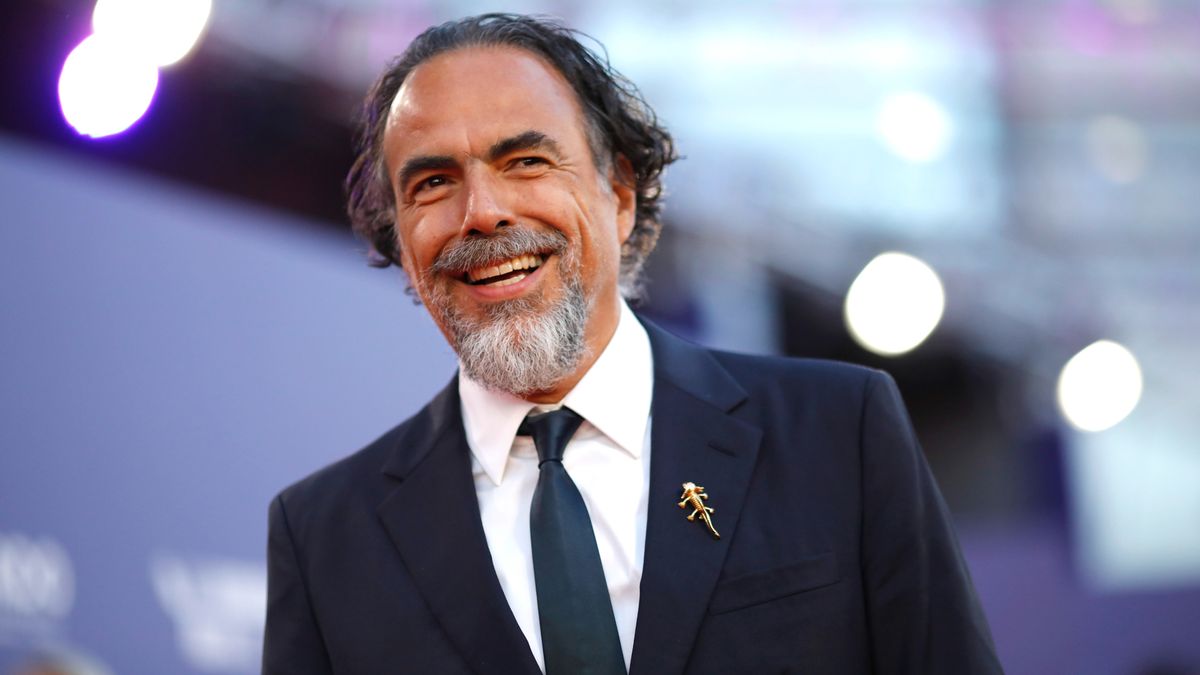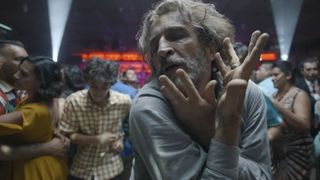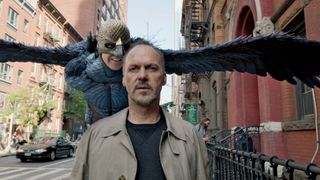Alejandro González Iñárritu talks Bardo: "To make a film is relatively easy – but to go inward, it's a very scary place"
Exclusive: Total Film meets Alejandro González Iñárritu to discuss his "misunderstood" new movie Bardo

With Birdman and The Revenant, Alejandro González Iñárritu became only the third-ever filmmaker to win the Oscar for Best Director for two consecutive movies – and the first to accomplish that feat in 65 years. Now, Iñárritu returns with Bardo, False Chronicle of a Handful of Truths, and the awards have not exactly been forthcoming.
After debuting on the festival circuit, Bardo received mixed reviews, with many critics complaining about its length and dream-like narrative. The film follows Daniel Giménez Cacho's Silverio Gama, a Mexican journalist and filmmaker who's struggling to find purpose in his work, with the pressures being put upon him, and with his family. Much has been made about the character's likeness to Iñárritu, and indeed, the movie features many meta-narratives, including the fact Silverio is making his own fictional film that incorporates elements of his real life.
It's tricky, at times, to separate what's truthful about Bardo and what's not, but that's the entire point. During an interview conducted at the London Film Festival, Iñárritu tells Total Film that you're meant to read into that subtitle – False Chronicle of a Handful of Truths – and see that the real truth is in the emotions these characters feel. "It is truthful, but it's false!" he says in the same breath. We dived deep into what exactly that means – here's the full Q&A, edited for length and clarity.

Total Film: This feels like a movie about displacement that's very personal to you, but also one that will resonate with many who have left their country for others. I wonder though, why make this film, that touches on these topics, now?
I couldn't do it before. I was not ready, I was not in the need for it. It's something that comes naturally, organically, subconsciously. When you accumulate so many emotions that have been trapped, that are contradictory, one to the other, and you have been busy with life, then suddenly, there is a moment that they have to be manifested, and you have to intoxicate yourself in things that have been under wraps. So I think that my moment came for me, at my age, and then I was ready to make an introspection and to share a form of an intimate outer fiction, all these slices of memories and dreams and fears and reflections and regrets and things that have been shaping me as a human being, as a Mexican with stories that have shaped my country and myself, to the most minimal, intimate details of looking for the whistle of my father that I don't remember. In a way, all these things are a metaphorical way for me to express what I needed to. By why at this moment? I don't know.
The movie concentrates on a Mexican journalist who becomes a worldwide sensation, and there are obvious parallels with yourself. There's also the full title of the movie – Bardo: False Chronicle of a Handful of Truths. Mixing reality and fiction. Was it easier to project talking points about your own life onto a fictional character rather than tell a straight biographical story?
There's a very thin line where some people could have misunderstood, or when you make an interview and one line can be out of context, and that creates a whole misperception about things. For me, there's a thin line between an autobiography, which is founded in true events, chronologically with certain elements that you claim that was what happened, but this is not an autobiography. This is not a journal. This is not a memoir in a traditional, conventional way. This is much more for me, an intimate outer fiction that does not claim truth. That's why the subtitle is a guide so that it's not misunderstood. But even some journalists were like, "This is you."
Sign up for the Total Film Newsletter
Bringing all the latest movie news, features, and reviews to your inbox
It's not me. That's why it's called False Chronicle of a Handful of Truths. It is truthful, but it's false! And chronicle is one of the most generous and eclectic genres that allow many genres to be included in it. You can put journalism, you can put documentaries, you can put essays, you can put memoirs, you can put commentaries, quotes, and a chronicle is that, but it's its own thing at the same time.
What I'm saying is that through an alter ego, which is [Daniel Giménez Cacho's character] Silverio Gama, I was able to put a lot of these things that do not claim truth, but the emotional conviction that represents a lot of the things that I have been through in the last 21 years. I'm not talking about my childhood, because I barely remember my childhood, I cannot depart from that. I just know that all these things that I talk about here are the things that really have been shaping me and getting into my mind the last years that I was putting this together.
The subtitle is long, but it's exactly a guide to understanding what this film is made of. So I don't know why there is still confusion about if it's me or not. I talk about my personal experience, from my point of view of what I have been going through, but at the same time, the more personal it gets, the more universal it becomes. By trying to recollect my memories, I collect a collective memory of millions of people like me that have been dislocated and have fractured identities, emigrating from other countries, and all that you lose on the way – and all that you gained.

The first major scene in this movie is a birth, but it's a dream sequence. It really took me by surprise after reading that this movie has an autobiographical side, and then we see a baby being born, but then the baby wants to go back into the womb.
But shouldn't we provoke that? Shouldn't we shake conventional narrative? Shouldn't we really approach something so personal as I went through [Iñárritu and his wife, editor Maria Eladia Hagerman, lost a child just days after they were born], because I have the strength now to separate from 25 years that that happened. I wanted to really challenge myself to say, 'Okay, I'm ready to say that, and see it with another view, with love, even the absurdity that life comes and goes for everybody.' But when something so unexpected, when something happens like that, it makes your life so fragile, that you are shaken, and you are affected. But suddenly you know that this is the rule of our existence, that you come and go, we are shadows, and you say, 'Okay, I want to shake that and I want to embrace and I want to observe that with some tenderness, and some absurdity.'
You've said previously that this movie was harder to make than the Revenant, and I imagine that's because of that introspection rather than the filmmaking.
To make a film is relatively easy when you have something to hold on to. There are rules and techniques, there are certain recipes. When you go inward, when you get into the introspection, it's a very scary place because there are no rules, there are no answers, you get lost and it's very elusive. And what we do normally has a lot of risk, but this, not having anything to hold on to and to have everything possible, it's a very difficult thing to convey. I didn't want to have any structure because I didn't have any structure. When you put together all this, it's elusive. Once I got all these sequences, I wondered how to flesh out the borderline between what is reality and imagination. You can go obvious, "Oh, it's a dream," or, "Oh, it's a real film with some crazy things," but how do you navigate the flow of consciousness? To get that visually was an incredible journey because I have never done that before. That's how I interpreted it, but it was difficult to put it together.
Because of that, everything in this does feel very specific, but the version I saw was 20 minutes shorter than the one that played at film festivals earlier this year. What went into that process? Why cut the movie down?
I barely took anything out. If you saw the original version, you would not notice it. It was just to really get into some moments a little later and get out a little earlier. And in a way, punctuationally to really make the internal rhythm of each of these moments a tiny bit stronger, solidly, and get to the point a little bit more clearly and faster. But nobody will have noticed where I cut the film, the film is intact. I learned that I could make it better. And actually, I could do two months more trying to shape it. Because it's true, the editing of a film is an endless journey. And it's a joyful process because you are shaping things. I could be doing it still.

Bardo also has a meta-narrative throughout. At one point, a side character, Luis, who's a populist journalist and reviewer essentially comments on the main character's work, and the comment is essentially about the movie we're watching. Luis, for instance, criticizes Silverio for using historical figures to make a point, then a few scenes later, the main character meets historical figures to make a point. Where's the line where you stop and don't do something because it will take the audience out of the movie?
There is no right or wrong or good or bad. That moment came to me as a conversation about two ex-collaborators where one became full of himself, which is Luis. He thinks that he possesses the truth and that he knows what people should think and what is right and wrong in a dogmatic way. He possesses that certainty. That is what is really very strong in the world. That's why it's so polarised, because every aspect in politics, in religion, in everything, everybody thinks they possess the truth. Nobody is allowing certainty. That's a bad word. You should be solidly on one side or the other, you cannot be in the middle. And that guy represents that.
And obviously, in the world that we are living, we're clicking and there's this massive social media that can become very toxic. This guy represents that compared to Silverio, who is absolutely questioning everything, about his own work as a journalist, as a filmmaker, and what's really important. He's questioning about success and whether truth actually exists. And that's why he said, "Fiction is the only way that we can scratch reality because everything is fiction." Our lives are fiction, the narratives of our lives are memories that we put together these events to make sense of us. But it's actually an outer fiction that we are putting together these pieces.
Every country is a fiction. Every country is a fiction because of the stories that we are fed since we are kids; the mythology and all this is a narrative that has been built, but it's actually very questionable. So what I'm saying is, the clash of these two guys is what I wanted to create. But obviously, I thought about the meta aspect because the film is a dream in a dream inside the dream – a story inside the story, story, story. I really had fun putting in that scene. That moment with Luis has become a reality now – that's what people say about the film itself. Some people became that guy, saying these things should be that way, and others accused me of doing exactly what the other guy said. It was so incredibly reaffirming.
When people find that scene, they will understand why it was such a ravish reaction from journalists because I put that ahead of the game and I put up a mirror, but I was laughing at myself. I can be harsher with myself than anybody else. I know my weaknesses and my flaws, and I can talk about it, and I can liberate myself and I can laugh about myself. But I was ahead of the game. When this came out and it became reality, it was so fascinating that the film was right and I am reaffirmed by this conversation!
That scene was knowingly funny and there's humor interwoven throughout the movie. It takes these huge topics seriously but also not too seriously.
I'm talking about my things and I'm talking about the American invasion in a funny way, or the Spanish Conquest, I did not want to be preachy, it's just that everything is relative, and everything is absurd. Every take that you want to take about everything, it's completely absurd, or it can be questioned. So that's why I think the film navigates between the absurd, and the emotional things, but never is one thing or the other; it is both things at the same time.
This movie is heading to Netflix, and we have seen streamers become the home of these more intimate stories while cinemas have become somewhat dominated by the big franchises. Is that how you see it?
In this case, it opened in Mexico, seven weeks in theatres. This film was designed and shot to be a cinematic experience, shot in 65mm, and with incredible sound design. I knew from the beginning that I was designing this for, what for me is the Cathedral, which is the cinema. For my generation, cinema is the whole thing, I cannot conceive to do something only for streaming. It's something that Netflix is honoring. And we have to give credit to Netflix to have the braveness and the courage to make a film like this, and then to put it in theatres and break their own rules.
Hopefully, more films like this will be done, because, yes, the streamers in a way have become this home for people like me. This film could have not been made any other way. This film, with no world stars, with a personal story in a foreign language, it's a difficult film. I financed it for one year by myself because I couldn't find financing. It's very difficult to get the money to make these kinds of films. So, streamers are becoming this home for things that are not in the conventional frame of IPs or are more reliable commercially. There's an approach not only by the studios but even the reviews. Everything has to fit in one frame. If not, you are overpowered by, "Oh my god, this guy went out of the fucking box."
I am really hopeful that over more time, it will be a natural combination between streaming services and finding exactly the right films to be shown in the cinemas and exhibitors allowing these films to be in their theatres, because sometimes they supposedly defend the films but they live by all these massive franchises. We will have to find the right balance and diversity. But in this case, I'm very proud about Bardo going to come to theatres.
Bardo is now on Netflix. For more, check out our list of the best Netflix movies now streaming.

Jack Shepherd is the former Senior Entertainment Editor of GamesRadar. Jack used to work at The Independent as a general culture writer before specializing in TV and film for the likes of GR+, Total Film, SFX, and others. You can now find Jack working as a freelance journalist and editor.
Most Popular
